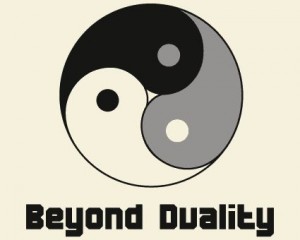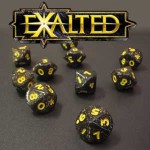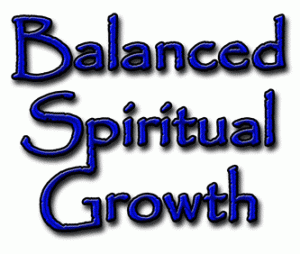Scope of Interest and Perspective
Scope: Micro and Macro Spiritual Perspectives
“Let our students survey the history of all mankind all over the face of the planet since the age when man’s pre-human ancestor first became human; but at the same time let them scrutinize the history of some local short-lived tribe or parish.” Arnold Toynbee (An example of the Micro perspective informing the Macro perspective.)
 Unifying Set Image – Triality Symbol – Positive, Negative and Neutral is the basis for this symbol. All flavors of the TAO, each aspect represents the mystical prime number of three, the trinity.
Unifying Set Image – Triality Symbol – Positive, Negative and Neutral is the basis for this symbol. All flavors of the TAO, each aspect represents the mystical prime number of three, the trinity.
Common Color – Earthly Green
Background Image – Each has it’s own image matching its perspective. See the unique description about each card’s background.
When either of these Cards is selected,
Consider how much impact and upon how many people is going to occur. This subsets specifies an aspects that speak to the issue of breadth of perspective: personal or planetary, individual or group, private vs. public. The contrasting qualities which further permeate each concept, suggest a layer where one should consider the influence of a card as directing our attention more specifically and about oneself. Or, toward a more philosophical or general broad expression of a notion we hold about a wider group.
Scope Micro and Macro – Contrasting Ordinal and Cardinal Perspectives
Instead, view Ordinal and Exalted as Micro and Macro frame of reference able to “drill down into the details” or see “the big picture.” In many Social Sciences, particularly Economics and Sociology, this distinctions render highly valuable distinctions about how we view and operate in our world(s), as individuals and as groups. If you were to pick either of this scope cards, be alerted and instructing to employ either a microscope in your analysis, or use a telescope to reach out beyond the immediate to fix the current situation in a broader context. Another equally explanation contrasts focusing on the short run or current, with taking the long view or looking to the long run suggesting time placed effects or your situation: now or later.
Short Run and Long Run (See related concepts to time)
Economists will tell you that far too many of us are short run oriented. That is to say, that we have tendency to look for immediate effects (or payoffs) rather than persevere into the long run. To be sure, such phrases as these have variable meanings relative to the type of planning or vision one might be looking at, but equally true is the need that short run thinking has to reduce stress and see immediate gain.
Big Picture vs the Snapshot
Holistic perspective is often difficult to capture because of the nature of System Complexity. The larger the system the more factors that are involved with it, and thereby the more variable and unpredictable it might be. However, this does not mean that it is impossible to imagine large scale effects, but merely the timing and the specific areas where problems may arise increase geometrically.
For individuals, the process of living life causes them to focus upon the needs of the short run as noted by Maslow’s Hierarchy of Needs. The long run of any life may be directed toward self-actualization, but that aspiration, or for that matter process of building achievements and accumulating stable resources bases, escape many of the worlds: middle classes, working classes, or poverty stricken whose time is completely absorbed and focused upon survival needs.
If one of these cards appears you are being instructed to consider issues related to your current or situational perspective about the long run effects of your short term actions. By contrast, it may also imply
Formal and Informal & Public and Private
Ordinal has the qualities of informal and personal. Whereas Exalted scope inherently is expansive and relates to the system at large, and one’s formal place in it. The contrast here would be the difference of going in front of your father for consequences of an action within a family; and that of appearing before a judge who can dismiss or pronounce sentence as part of a community or state crime. The consequences of the first, by the way, generally stay private and are dealt with informally within the family structure. But commit a larger, social transgression, then the act is very public and enters into the formal structures of a judiciary. The crime and punishment are open for everyone to see, and vetted as part of a larger formal program of social engineering.
Individual and Group & Rights and Responsibilities
Political arguments often hover around a topic paraphrased by Mr. Spock in Star Trek II[1] “the good of the many outweigh the needs of the few…or the one.” Personal rights and concerns bumping up against public or institutional, more likely a state or organizational entity. The current debate in the United States about the Citizen’s United Case typifies the confusion when individual rights (Ordinal) are presented to a collective entity like a corporation. In itself, to consider a corporation a “person” is on its face absurd because even if such an entity were to be “terminated” or become cease operation – no living being is lost. Instead, the great travesty of such a declaration happens when law allows actual living humans, who are the owners and directors of said enterprises; to exert control and influence without the benefit of public disclosure or legitimate accountability. For we as humans to confuse individual and enterprise, consequences like these arise leaving a concerned public no ability to witness and then collectively regulate an organizations activities or at least make them equal in regards to others. All individuals share rights; whereas entities are granted license, privileges, benefits, and entitlements from society which are market driven, but not inalienable to them as a living being. This is a place where the Exalted power of a large entity encroaches into the domain of the particular.
(According to Wikipedia, this constant cycle of changing words is known as the euphemism treadmill.)
- Comparing these two stations in life: which one do you relate to? Which one gets more respect and more privilege? Is there a balance between the actual work done, risk taken, and rewards received?
- The General – Exalted
- The Soldier – Ordinal
- Here is an example of comparing contexts between an exalted and ordinal perspective…
- Exalted is the public self or persona, no matter what the scale or scope. Together, group, self-transcendent, (reference – Ghost in the Machine) dissociated image. Bob Dole speaking of “Bob Dole” or politicians of themselves as we. (Can become grandiose, self deluded, but far more significantly to accountability – they are detached and dissociated from the “IT” they created, the image, the identity, the brand..)
- Ordinal, by contrast, is personal and private. It’s point of view is self acquisition, realization, and self preservation. (Can become defensive and selfish)
- From the standpoint of the exalted or the General: is concerned about the large scale. Strategy and tactics. Command and control. Pride and pageantry. Looking stately and patriotic. Is concerned about the number of medals on his chest, being decorated, and the over all distancing from the soldiers.
- From the standpoint of the ordinal or the soldier: the soldiers perspective is on the battlefield, then potentially in a hospital, or missing a limb, or in a wheelchair; they receive the orders, they are more concerned with individual momentary action and having to stay alive.
[1] Actually found in Tale of Two Cities by Charles Dickens pg. – Phrased a bit differently in the Utilitarian view of things: “It is the greatest good to the greatest number of people which is the measure of right and wrong.” By Jeremy Bentham
In the Michael Teaching, the ideas of Exalted, Ordinal or Neutral carry with them a commentary about one’s innate proclivity to think about things generally, specifically, or be as an integrated whole. The Scope of any question refers to a measure of coverage or the size of a container or the breadth of a point of view. It represents the degrees to which an idea is inclusive and broad or exclusive and restricted. Scope may be thought of as containers of various sizes. A container is either large holding many things all at once mixed together or in a honeycomb of chambers. Or a small, unique and individual package or skin suited just for one thing. And of course, all sizes in between. Exalted Overleaves are those containers with wide breadth of coverage and tend toward the conceptual formation of a system as a whole rather than its parts. Ordinal Overleaves concentrate their range onto the tangible parts, or the immediate and doable in aspects of a problem or design.
|
Qualities |
|||
| Scale | Macro | Micro | Assimilative |
| Interest | Group | Individual | System |
| Dimension | Vertical | Horizontal | Depth |
| Purview | General | Specific | Suspension |
| Reception | Analog | Digital | Nonaligned |
| State of Being | Expanded | Contracted | Inert |
| Appearance | Reflective | Opaque | Transparent |
| Concern | Conceptual | Tangible | Void |
| Focus | Broad | Narrow | Instance |
| Creation | Plan | Build | Utilize |
| Mathematics | Positive-Additive | Negative- Substractive | Equivalence |
| Analysis | Thesis | Antithesis | Synthesis |
Exalted (Read the Exalted Card)
 In the Exalted (large and broad) extreme, you have the Infinite-Macrocosmic panoramic vista seeking pattern and synthesis on a grand scale. Darwin’s Theory of Evolution, for example, is so broad in scope that we can use in a myriad of science disciplines but also employ with equal power metaphorically to principles in virtually every aspect of human understanding. For the Entity Michael, this would be an example of a theory that is Cardinal in its impact, applicability, usefulness, and Exalted in its expansiveness in effect.
In the Exalted (large and broad) extreme, you have the Infinite-Macrocosmic panoramic vista seeking pattern and synthesis on a grand scale. Darwin’s Theory of Evolution, for example, is so broad in scope that we can use in a myriad of science disciplines but also employ with equal power metaphorically to principles in virtually every aspect of human understanding. For the Entity Michael, this would be an example of a theory that is Cardinal in its impact, applicability, usefulness, and Exalted in its expansiveness in effect.
Ordinal (Read the Ordinal Card)
 At the other sided of the scale the Ordinal (the small and specific), you have the Infinitesimal-Microcosmic examination, scrutinizing the most miniscule of elements. In contrast to the expansive, a refined, narrow, or precise focal point excludes all other elements or distractions and makes the point of view so microscopic as to discern the tiniest refinements in even the smallest detail. Quantum Physics might be considered Ordinal in focus because it delves into the fractional components of the atom itself. A Universe within a microverse.
At the other sided of the scale the Ordinal (the small and specific), you have the Infinitesimal-Microcosmic examination, scrutinizing the most miniscule of elements. In contrast to the expansive, a refined, narrow, or precise focal point excludes all other elements or distractions and makes the point of view so microscopic as to discern the tiniest refinements in even the smallest detail. Quantum Physics might be considered Ordinal in focus because it delves into the fractional components of the atom itself. A Universe within a microverse.
Both Perspectives are necessary and both produce a useful understanding. Together they form the means by which we can recognize a coherent, interconnected space and then locate within it exact coordinates of placement. The forest and the tree must be understood as a life cycle and a unique entity to compliment the function of the one and meaning of system as a whole. It understanding the unique parts of sea water our comprehension of the workings of the whole of the oceanic system of our planet comes into play.
Neutral
 But the whole itself is both. Beingness as can be said of any whole, integrated thing is more that the sum of its parts. Totality of anything is the acceptance of its existence with complete Neutrality. Recognizing ones part in a greater whole does not infer ignorance nor indifference but complete Assimilation and sense of oneness. Within the Michael Teaching, it is the state of Neutrality that brings about Inculcation, complete and total integration of an experience at all of the Centers, to bring about an assimilation of that material into the fabric of the Personality and Essence. And from their, ones consciousness through the mechanism of Soul Age advancement, is ratcheted upward to a new level of the spiral of spiritual evolution.
But the whole itself is both. Beingness as can be said of any whole, integrated thing is more that the sum of its parts. Totality of anything is the acceptance of its existence with complete Neutrality. Recognizing ones part in a greater whole does not infer ignorance nor indifference but complete Assimilation and sense of oneness. Within the Michael Teaching, it is the state of Neutrality that brings about Inculcation, complete and total integration of an experience at all of the Centers, to bring about an assimilation of that material into the fabric of the Personality and Essence. And from their, ones consciousness through the mechanism of Soul Age advancement, is ratcheted upward to a new level of the spiral of spiritual evolution.
The Neutral quality in Overleaves reflects the integrated mechanism which by all reckoning of existence spring forth: the Yin-Yang of the TAO. Both and together are truly indivisible yet may be seen uniquely in effect they present. Neither the speculations of YANG science nor the intuitive poieses[1] of YIN religion has preceded us or will outlast us. We have cataloged and categorized Nature’s functions with our Ordinal senses, but still cannot capture the Exalted magnificence of an interrelated biosphere in which we all exist and participate. And yet while we are swept up at the very least by the awe inspiring and wondrous indivisibly of it all, it evokes a simpler quality, personal and unique to each; beauty.
Together these three: seeming polar opposites orbiting a central unity, cast from their interplay – existence, purpose, and as such, meaning. Thus when you consider the augmentation of Exalted, Ordinal, and Neutral as a metaphor for the structure of all existence; you will gain further footing for comprehend the structure of trinities in every aspect of understanding. Father, Son, and Holy Spirit; proton, electron, neutron; time, space, eternity; Brahma, Vishnu, Shiva; proteins, fats, carbohydrates; inhale, exhale, pause; solid, liquid, gas; past, present, future; energy, matter, light; masculine, feminine, hermaphrodite, and finally should be, could be, and is. And what IS, is TAO in the present: an eternal moment.
All people possess each quality through the lenses of their combined Overleaves. Far sighted, near sighted, distortions or refinement are all measures of degree and the interplay of the forces of one’s Overleaves and the poles they occupy at a given moment. One only analyze the Overleaves in total to see all three force playing upon ones vision to note the range of sight (foresight, insight, or hindsight) one might natively possess. If you can assess and then comprehend the “distance” of your vision, sharpen it within your positive poles, understand its full range from the neutral perspective of that Overleaf and then recognize distortions in the negative poles you will be well on your way to clearly viewing your unique world and focusing your efforts in a meaningful way in concert with the person you are at Essence.
[1] The Greek “to make”. But the word has philosophical implications to the mind as being an imposer of form, and shape and through vision and creation itself. The word is the root for poetry. One’s life is a poem, epic, commonplace, tragic, comedic or aesthetic. It is spoken in the narrative of the mind, but written in one’s deeds.


